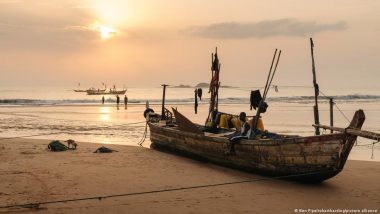In some countries along the Atlantic coast, African fishermen are running out of fish. Overfishing is becoming a growing issue, as both foreign ships and harmful practices among local fishermen are depleting the ocean.Baskets filled with beautiful fresh fish — a mouthwatering sight for many. But these kinds of abundant catches are becoming rare along Africa's Atlantic Coast. Years of bad fishing practices and overfishing have increasingly devastated the seabed.
Also Read | Imran Khan Arrest: Pakistan Army Pre-Planned Former PM's Arrest, Says Report.
Artisanal fishermen are struggling to find fish and feed their families, while massive global trawlers are having to resort to more and more inventive — and often destructive — methods to keep their business model going. Solutions for more sustainable practices seem hard to come by. And on top. the climate crisis isn't exactly helping, either.
A symposium held in Rabat, Morocco this week tried to explore ways to reconcile the fishing practices with the preservation of biodiversity. Some of the attendees at the ATLAFCO (The Ministerial Conference on fisheries cooperation among African States bordering the Atlantic Ocean) were the very local fishermen who are most affected by this turning of the tide.
"About ten minutes after putting the aquatic bulbs under the water … I would encircle [the fish] with the net," recalls Bertin, who has been fishing in the Bay of Benin for over 30 years.
For the 50-year-old man from Ghana, fishing used to be a rather lucrative business — until a few years ago.
Desperate measures
Nowadays. he and his fellow fishermen feel helpless, as they see large foreign boats in the distance racing in first to snatch off their catch of the day, while artisanal fishermen like Bertin still go out to sea in canoes and small vessels. The competition looks like a game of David versus Goliath.
But that's by far not the only issue: Off the coast of Ghana, due to years of overfishing, the quantity of fish caught has almost dropped by half in the past fifteen years. Bertin doesn't know what the future holds.
However, just like the major fishing conglomerates, local fishermen are also seeking more and more inventive ways to continue reeling in their catch. For example, artisanal fishermen in Ghana now resorting to poison and even dynamite to kill fish at night.
"In Ghana, I have seen people using chemicals like a soap powder called Omo. Some use heavy means like dynamite. With these techniques, you can just pick [the fish] up," says Bertin.
Locals are a part of the problem
These technique, however, also take a heavy toll on the environment and are therefore against the law. Against this backdrop, Bertin's complaints about struggling to secure his livelihood might fall on deaf ears, as he appears to have become part of the problem with such unsafe practices.
Rodrigue Pelebe, a researcher at the Africa Center of Excellence in Coastal Resilience at University of Cape Coast stresses that the use of dynamite and chemicals "destroys the marine or aquatic environment and aggravates the already-difficult situation.
"It contributes to the destruction of corals, impacts the ecological balance of life in coral reefs, and upsets the entire food chain," he told DW, adding that even when authorities clamp down on these illegal practices, fishermen continue to find new ways to scrape the bottom of the ocean.
"They still develop other harmful practices to capture the little that remains," Pelebe explained, stressing that there are several studies underway to determine the exact damage and extent of these techniques being performed for years.
The marine scientist said that despite dwindling numbers of fish being enough proof of the disastrous impact of these practices, artisanal fishermen still fail to understand the consequences of their actions, ignoring the regulations that govern their profession.
But the issue is not one of sustainability alone: According to the United Nations, 2.7 million people — almost 10% of the total population of Ghana — make their living through fishing. Furthermore, about 60% of the protein consumed in Ghana is based on fish and seafood. With the seabed running dry, food supply issues are also increasingly becoming a corollary of the crisis at sea.
An unending vicious cycle
During the symposium in Rabat, all participants agreed in principle to seek remedies to the current situation, as the situation off the West African coast alone cost the affected countries in the region at least $2.3 billion (€ 2.1 billion) each year.
Abdennaji Laamrich, head of the ATLAFCO cooperation and information systems, said that bettering monitoring is required to begin to address — and assess — the situation, adding that African state must "also fight against the harmful techniques of local fishermen and illegal fishing."
The latter appears to be the easy part in the battle against overfishing practices: Amadou Tall, program director at the Economic Community of West African States (ECOWAS), says that identifying harmful techniques among local fishermen is less difficult at least than getting on top of the latest practices employed in international waters by foreign vessels. However, Tall stresses that artisanal fishermen should become the scapegoat of an issue that is far more complicated.
According his view, illegal, undeclared and unregulated (IUU) is the main problem, representing up to 26 million tons of fish caught every year. As these practices are usually carried out at high sea and beyond the reach national jurisdictions, it is difficult to police these activities.
But even with IUU activities taking place miles out at sea, the ripple effect is again felt on the coast, with rural coastal populations in vulnerable areas being the most affected by such illegal overfishing practices.
And thus resumes the vicious cycle of locals seeking increasingly harmful methods to get their share of fish.
Edited by Sertan Sanderson
(The above story first appeared on LatestLY on May 11, 2023 03:40 AM IST. For more news and updates on politics, world, sports, entertainment and lifestyle, log on to our website latestly.com).













 Quickly
Quickly












